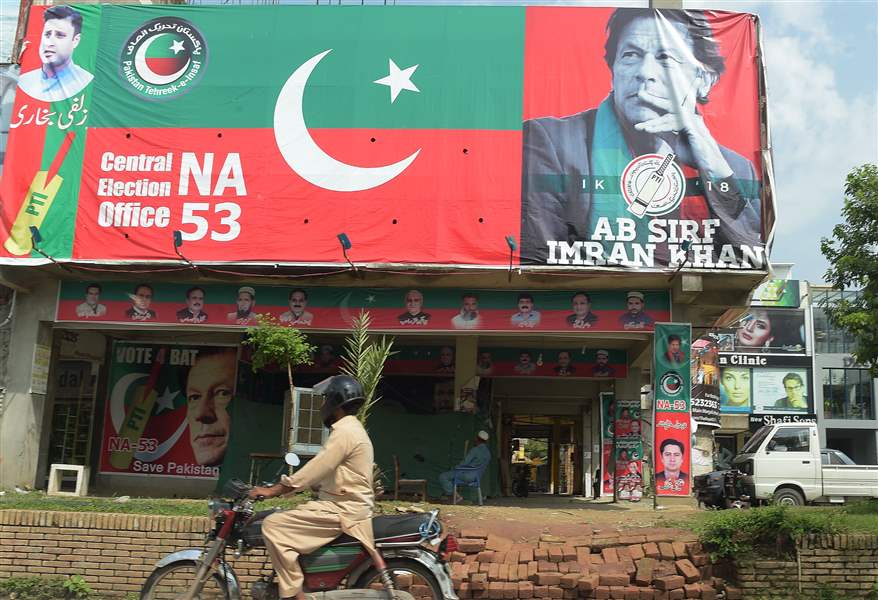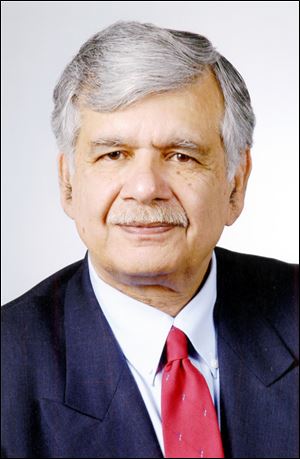
A new captain takes control in Pakistan
8/13/2018
A Pakistani motorcyclist rides past a billboard featuring an image of Imran Khan, head of the Pakistan Movement for Justice party, a day after the general election in Islamabad on July 26.
AFP/Getty Images/Aamir Qureshi

Dr. S. Amjad Hussain
There is a change afoot in Pakistan. In the recent general elections, Imran Khan’s Pakistan Tehrik-e-Insaaf (Movement for Justice) swept the elections by capturing 116 seats out of 342. Imran Khan is short of a majority by 56 seats but, with the help of independent lawmakers, he will be able to form a majority coalition and rule the country as prime minister.
As usual, the opposition parties cried foul and discredited Mr. Khan’s victory. They also said that Mr. Khan’s victory was engineered by the army. It may be true to some extent, but there was no massive vote rigging. Nature abhors vacuum and the political vacuum and endemic corruption in a country tempt the men in uniform to assert their influence. It seems that the army did not want the old politicians to return to the parliament.
Read the previous column by S. Amjad Hussain
For the record, Mr. Khan had also cried foul when he did not win in previous elections.
Pakistan has been ruled by the men in uniform for almost half of its 70 year existence. When the army was not ruling the country, two political dynasties, like a game of musical chairs, ruled the country. The Muslim League-Nawaz (MLN) and the Pakistan Peoples Party (PPP) have grassroot support and, despite their penchant for corruption, they have always won the elections. But not this time.
Oxford-educated Imran Khan’s turn-around from international playboy to an orthodox Muslim took everyone by surprise. So was his decision to launch a political party to improve governance and bring justice to the society. No one took him seriously in the beginning.
In the initial stages, his party could not win any seat in the parliament. In the last election, his party won the maximum seats. He has the reputation of being an extremely determined man.
Along the way, he burnished his credentials as an honest man. In early 1990, as his mother lay dying of cancer, he realized that there was not a single hospital in the country dedicated to treating cancer. He committed to build a state-of-the-art cancer hospital in Pakistan in his mother’s memory. He toured the country and the Pakistani Diaspora asking for donation. People responded generously to the sports hero — Mr. Khan led Pakistan to a World Cricket Cup victory in 1992.
In 1994, Shaukat Khanum Memorial Cancer Hospital was inaugurated in the city of Lahore. Since then, two more hospitals have been built in the country. The hospitals provide free care to 70 percent of patients.
His political party attracted idealistic young crowd but did not get traction across the country where the other two political parties — MLN and PPP — remain deeply entrenched. The tide turned in Mr. Khan’s favor in 2013 when he not only secured handful of seats in the parliament but enough seats in the northwestern province of Khyber Pukhtunkhwa (KPK) to form a coalition government.
For five years, his party ran the province with an efficiency and a transparency that was sorely missing in previous governments. Mr. Khan demanded honesty, integrity, and good governance from government officials. Anyone who resisted or opposed was shown the door. Many government ministers were sacked if there was any evidence of corruption. Such practices resonated with people and they returned his party to power by a solid majority in recent elections.
Could he bring the same accountability and transparency in governance to the entire country? Skeptics and naysayers aside, there are some fundamental issues that he would have to tackle as prime minister.
The economy is not doing well. The Pakistani rupee has fallen almost 50 percent in the past few years and is now trading at 150 rupees to one American dollar. Pakistan needs a robust injection of loans from the International Monetary Fund.
The stalemate in Afghanistan, the rise of fundamentalism in Pakistan, continuous animosity with India, and the hostile posture of President Trump towards Pakistan are some of the other prickly issues that Imran Khan would have to tackle.
On the Indian front, there is the thorny issue of Kashmir, which has stymied the relations between the two nuclear-armed countries ever since their independence from Great Britain in 1947. It would require all the finesse, charm, and political dexterity that Imran Khan can muster to move beyond Kashmir. Standing in the way would be none other than the army brass that has pursued an India-centric policy and, in the process, has entrenched themselves in Pakistani politics. It would be a Herculean task to remove the long shadow that the army casts on the country.
Politics is a dirty business. In order to properly govern, Imran Khan will have to seek cooperation of some seasoned but corrupt politicians. It is anybody’s guess if the former cricketer would be able to cobble together a team that would play on the uneven and unpredictable pitch of Pakistani politics. It is just the beginning of his first inning as the new captain.
S. Amjad Hussain is an emeritus professor of surgery and humanities at the University of Toledo. His column appears every other week in The Blade. Contact him at: aghaji@bex.net.